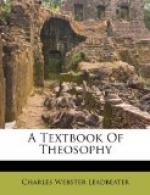Always he applies this criterion: Is the thing right or wrong, does it help evolution or does it hinder it? If a thought or a feeling arises within himself, he sees at once by this test whether it is one he ought to encourage. If it be for the greatest good of the greatest number then all is well; if it may hinder or cause harm to any being in its progress, then it is evil and to be avoided. Exactly the same reason holds good if he is called upon to decide with regard to anything outside himself. If from that point of view a thing be a good thing, then he can conscientiously support it; if not, then it is not for him.
For him the question of personal interest does not come into the case at all. He thinks simply of the good of evolution as a whole. This gives him a definite foothold and the clear criterion, and removes from him altogether the pain of indecision and hesitation. The Will of the Deity is man’s evolution; whatever therefore helps on that evolution must be good; whatever stands in the way of it and delays it, that thing must be wrong, even though it may have on its side all the weight of public opinion and immemorial tradition.
Knowing that the true man is the ego and not the body, he sees that it is the life of the ego only which is really of moment, and that everything connected with the body must unhesitatingly be subordinated to those higher interests. He recognizes that this earth-life is given to him for the purpose of progress, and that that progress is the one important thing. The real purpose of his life is the unfoldment of his powers as an ego, the development of his character. He knows that there must be evolvement not only of the physical body but also of the mental nature, of the mind and of the spiritual perceptions. He sees that nothing short of absolute perfection is expected of him in connection with this development; that all power with regard to it is in his own hands; that he has everlasting time before him in which to attain this perfection, but that the sooner it is gained the happier and more useful will he be.
He recognizes his life as nothing but a day at school, and his physical body as a temporary vesture assumed for the purpose of learning through it. He knows at once that this purpose of learning lessons is the only one of any real importance, and that the man who allows himself to be diverted from that purpose by any consideration whatever is acting with inconceivable stupidity. To him the life devoted exclusively to physical objects, to the acquisition of wealth or fame, appears the merest child’s-play—a senseless sacrifice of all that is really worth having for the sake of a few moments’ gratification of the lower part of his nature. He “sets his affection on things above and not on things of the earth”, not only because he sees this to be the right course of action, but because he realizes so clearly the valuelessness of these things of earth. He always tries to take the higher point of view, for he knows that the lower is utterly unreliable—that the lower desires and feelings gather round him like a dense fog, and make it impossible for him to see anything clearly from that level.




